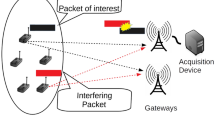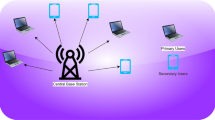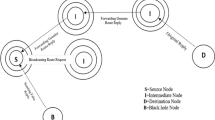Abstract
In this paper, we propose a novel on-demand energy-aware routing protocol, UBPCR [utility-based power control routing], which reduces the trade-offs that arise in the other energy-aware route selection mechanisms that have recently been proposed for mobile ad hoc networks. Our approach is based on an economic framework that represents the degree of link's satisfaction (utility). With UBPCR, the utility function for any transmitter-receiver pair is defined as a measure of the link's preference regarding the signal-to-interference-and-noise ratio (SINR), the transmit power, and the transmitter's residual battery capacity. During a route-searching process, each intermediate node between the source and the destination is executed via two consecutive phases: the scheduling phase and the transmit power control phase. The scheduling algorithm finds the proper qualified data slot for the receiving channel so that the transmissions of independent transmitters can be coordinated. The transmit power control determines the optimal power, if one exists, that maximizes the corresponding link's utility. Extensive simulations show that the UBPCR protocol can achieve incompatible goals simultaneously and fairly.
Similar content being viewed by others
References
E.M. Royer and C.-K. Toh, “A Review of Current Routing Protocols for Ad Hoc Mobile Wireless Networks”, IEEE Personal Communications, Vol. 6, pp. 46–55, April 1999.
K. Scott and N. Bambos, “Routing and Channel Assignment for Low Power Transmission in PCS'', In Proc. of the 5th IEEE Int'l Conf. Universal Personal Commun., Vol. 2, Oct. 1996.
S. Singh, M. Woo, and C.S. Raghavendra, “Power-Aware with Routing in Mobile Ad Hoc Networks”, In Proc. of the Fourth Ann. ACM(IEEE Int'l Conf. Mobile Computing and Networking, 1998.
C.-K. Toh, “Maximum Battery Life Routing to Support Ubiquitous Mobile Computing in Wireless Ad Hoc Networks”, IEEE Communications Magazine, Vol. 39, pp. 138–147, June 2001.
R.J. Gibbens and P. Key, “Distributed Control and Resource Marketing Using Best Effort Routers”, IEEE Network, Vol. l, No. 15, pp. 54–59, May/June 2001.
F.P. Kelly, “Charging and Rate Control for Elastic Traffic”, European Transactions on Telecommunications, Vol. 7, pp. 33–37, Jan. 1997.
P.B. Key and D.R. McAuley, “Differential QoS and Pricing in Networks: Where Flow Control Meets Game Theory”, IEE Proceedings Software, Vol. 2, pp. 39–43, March 1999.
H. Ji and C.-Y. Huang, “Non-Cooperative Uplink Power Control in Cellular Radio Systems”, Wireless Networks, Vol. 4, pp. 233–240, April 1998.
Goodman DJ and Mandayam NB, “Power Control for Wireless Data”, IEEE Personal Communications, Vol. 7, pp.48–54, 2000.
Mingbo Xiao, Ness B. Shroff, and Edwin K. P. Chong, “A Utility-Based Power Control Scheme in Wireless Cellular Systems”, IEEE/ACM Trans. on Networking, Vol. 11, pp. 210–221, April 2003.
C.E. Perkins and E.M. Royer, “Ad-Hoc On-Demand Distance Vector Routing”, In Proc. of the 2nd IEEE Workshop Mobile Computing System and Applications, pp. 90–100, Feb. 1999.
D. Fudenberg and J. Tirole, Game Theory, Cambridge, MA: MIT Press, 1991.
H. Holma and A. Toskala, Eds., WCDMA for UMTS, New York: Wiley, ch. 8, 2000.
W.C.Y. Lee, Mobile Communications Design Fundamentals, 2nd ed. New York: Wiley, ch. 2, pp. 59–61, 1993.
Author information
Authors and Affiliations
Corresponding author
Additional information
Chan-Ho Min received the B.S. degree in Industrial Management and the M.S. degree in Industrial Engineering from Korea Advanced Institute of Science and Technology (KAIST) in 2000 and 2002, respectively, where he is currently pursuing the doctoral degree in Industrial Engineering (Telecommunication Engineering Interdisciplinary Program) at KAIST. His research interests include the optimization problems of radio resource management for broadband wireless/cellular/ad hoc/satellite communication networks. In particular, he focuses on mobile ad hoc networking.
Sehun Kim received the B.S. degree in Physics from Seoul National University, Seoul, Korea, and the M.S .and Ph.D. degrees in Operations Research from Stanford University. In 1982, he joined the faculty of the Korea Advanced Institute of Science and Technology (KAIST), where he is currently a Professor of Industrial Engineering. His research has been in the areas of combinatorial and nonlinear optimization. Recently, he is working on the application of optimization techniques to the design and analysis of computer and communication systems. He has published a number of papers in Mathematical Programming, Operations Research Letters, Journal of Optimization Theory and Applications, IEEE Trans. on Vehicular Technology, and International Journal of Satellite Communications.
Rights and permissions
About this article
Cite this article
Min, CH., Kim, S. On-Demand Utility-Based Power Control Routing for Energy-Aware Optimization in Mobile Ad Hoc Networks. Wireless Pers Commun 41, 259–280 (2007). https://doi.org/10.1007/s11277-006-9142-6
Received:
Accepted:
Published:
Issue Date:
DOI: https://doi.org/10.1007/s11277-006-9142-6




